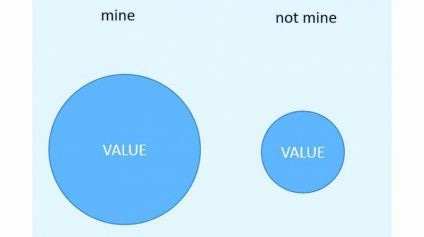The Endowment Effect
We value the things we already have more than the value others would put on them.
ELT Pros On Linkedin | Video Library | Our Blog | ELT Buzz News | TpTs
Last month I read this excellent post by Russ Mayne — The Authenticity Trap. He relates how in our culturally dominated and fatalistic ways, we fall into a trap set up by culture.
We tend to think that a Japanese sushi chef must be better than a Nigerian one, one from Pennsylvania. We believe so even before having evidence and even despite the evidence. Just because the chef is Japanese, we believe the sushi tastes better! Same in education and with native speakers. There is an authenticity trap. I think there are other “traps” out there that educators should be aware of and perhaps can avoid with a little bit of foreknowledge. One such trap is — the endowment effect.
Before explaining what the endowment effect is and how it relates to education, let me tell you a story by way of illustration.
Years (decades) ago, I did my Masters in Education (TESOL). I finished in flying colors after 2 years. I was proud of myself, rightly so. But after this period of study, I often talked about my degree with glowing colors. How it was the best ever. Probably the toughest degree to get out there. I recommended it to everyone. I was wedded to my experience and the quality of my degree and study. It was the best because I owned it, I had done it.
Now, looking back on the courses, the professors I studied with, the demands of the course, the structure and syllabus — I don’t think too highly of it. After teaching at the graduate level a good number of years — I realized the course was just — par. But what had made me think it the best, beyond compare for a good number of years? The endowment effect.
Behavioral economics coined the term “endowment effect” to represent the rather queer but always true fact that we over value what we own. There is always a big difference between the price an owner assigns their “stuff” than the price someone is willing to pay. This gap is the endowment effect.
Now, you might not see it operating right in front of your face but the fact is, the endowment effect is very healthy and alive in education. We overvalue so much and judge "emotionally" and because of our "ownership" and attachment rather than based upon the evidence. This is a problem.
Here are some examples of how the endowment effect operates in education.
Change. Education and schools, organizations are very conservative. Change is slow. Why doesn't education keep up with the times and adopt new practices, ways of teaching? Part of the problem is the endowment effect. Once we've instituted a certain syllabus, once a school is using a certain platform, they overvalue its worth and thus, are blind to a need to change and what might be better.
It is the same with teachers. They are slow to change. How many teachers change their syllabus, materials, approach constantly rather than rolling it over for the next cohort of students? Why do we so overvalue the materials, coursebooks we use? Are they really that good? Or is the endowment effect in operation?
Certification. - As my above story clearly shows, we overvalue our own credentials and professional development. Everyone thinks their course is the best. Number one. Thus, it is hard for someone to reliably choose a course based on empirical criteria. The voice of the crowd governs.
Teacher evaluation. I've had the privileged over the years to enter many classrooms and provide feedback to teachers. And when you ask students about their teacher, how good their teacher is .... they almost always say, "the best"! "one of a kind" etc ... Same often with administrators, psychological bias gets in the way of proper evaluation of teachers.
Innovation & Leadership. Paula Rebolledo tweeted this recently .....
Most educational innovations, contrary to what they claim, do not allow for self-development and “perpetuate the ‘I say-you follow’ superior-inferior relationship between policy makers and teachers." (Rebolledo, 2013) So there!
— Paula Rebolledo (@prebolledoc) May 1, 2019
What she is describing is how people "fall in line" and follow educational leaders blindly. Because they met them at a conference, got their book signed by them, had some kind of personal contact with the leader - they blindly follow and don't judge them based on their ideas/values/work but rather in a biased fashion. Especially in social media this leads to a lack of critical judgment and the "like" effect. Everyone just claps and nobody truly evaluates ....
There are a hundred other instances in education where the endowment effect "traps" and reigns. Do you have an example that might illustrate it in action?
Let's try to evaluate our practices, educational products, our relationships without the bubbling psychological bias the endowment effect applies!
Originally published at ELT Buzz.





